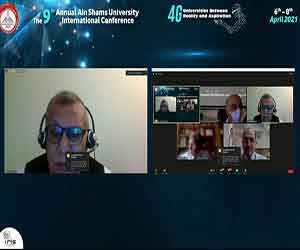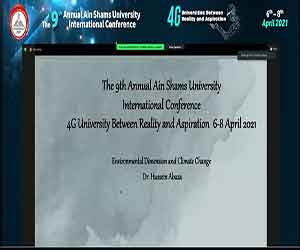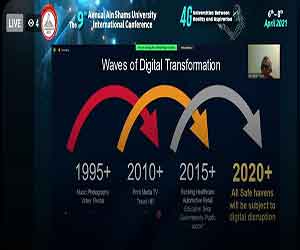Digital governance, the environmental dimension and climate change ... The axes of the first session of the basic sciences sector at the university conference
Under the auspices of Prof. Dr. Khaled Abdel Ghaffar, Minister of Higher Education and Scientific Research, headed by Prof. Dr. Mahmoud El-Metini, President of the University and President of the Conference, Prof. Dr. Ayman Saleh, Vice President for Postgraduate Studies and Research and Vice President of the Conference, Prof. Abdel Fattah Saoud, Vice President for Education and Student Affairs, Prof. Dr. Hesham Tamraz, Vice President for Community Service and Environmental Development, the first session of the basic sciences sector began within the framework of the activities of the second day of the ninth Ain Shams University conference entitled: "Fourth Generation Universities between Reality and Aspiration."
This is headed by Prof. Dr. Muhammad Ragaa Al-Satouhi, Dean of the Faculty of Science, and Prof. Muhammad Abu Zaid, Vice Dean of the Faculty of Science for Postgraduate Studies and Research, and it dealt with two topics. The first topic is digital governance: how to make the most of digital transformation. Prof. Dr. Khaled Nagm, Assistant Minister of Communications for Digital Governance Affairs.
Prof. Dr. Hussein Abaza, Adviser to the Minister of State for Environmental Affairs talked in the second topic about the environmental dimension and climate change.
 |
 |
 |
||
Prof. Dr. Khaled Nagm, Assistant Minister of Communications for Digital Governance Affairs, addressed the way to make the most of digital transformation, explaining that digital governance is a framework for establishment and accountability and helps decision-making authority and the most prominent evidence of the importance of digital governance is what happened in China during the Corona pandemic through the 5G technology that helped Reducing the rapid spread of the virus through robots and artificial intelligence devices.
Also, he talked about what happened in the delinquency crisis of the Evergiven ship in the Suez Canal and how this technology allowed us to solve the crisis with the hands of our sons and their precious efforts.
During the session, Prof. Hussein Abaza, Adviser to the Minister of State for Environmental Affairs, on the issue of the environmental dimension and climate change, and his Excellency spoke about the prevailing development patterns, climate changes, environmental degradation, the concept of sustainability, just and sustainable development patterns and the principles on which determining future directions, as well as the main axes for achieving sustainable development in Egypt and their priorities.
His Excellency also indicated several requirements to achieve future directions, including:
Ensuring security and stability and combating extremist ideology and corruption with all firmness and seriousness.
Activating a good governance system that is characterized by transparency, accountability, community participation, and the fight against corruption.
Ensuring a stable macroeconomic environment.
Providing a social climate dominated by social justice, equality and social harmony.
Imposing a package of legislations and market mechanisms to encourage the transformation of sustainable development.
Integration and integration of policies, plans, programs and coordination between state agencies.
Adopting a participatory and integrative methodology in formulating and implementing plans, programs and projects.
Building a partnership between the government and the people to ensure social harmony between the various groups of people.
 |
 |
 |
||


.svg)




